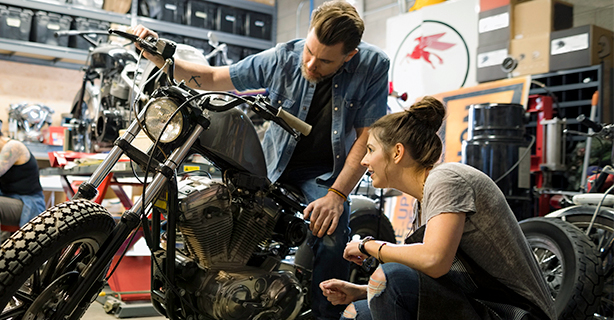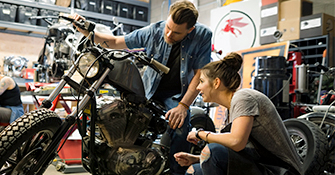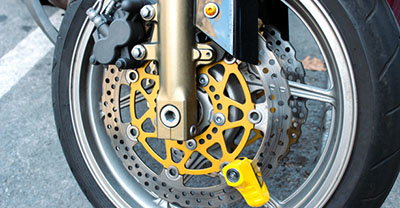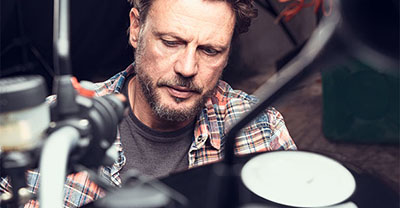Best questions to ask when buying a used motorcycle


0 min. read
Initial questions to ask about a used motorcycle
What’s the vehicle identification number?
Can you provide the proper certification, registration, and title?
Can I have a copy of the vehicle history report?
Knowing which questions to ask before making your used motorcycle purchase can mean the difference between buying a great used motorcycle at a sweet price or ending up with a bike that nickel-and-dimes you for years.
At the end of this post, you can download and print the full list of questions for easy reference and note taking to help you make a smart buying decision.
Questions to ask about a used motorcycle’s value and price

What’s the mileage of the motorcycle?
How was this motorcycle used? (e.g., as a commuter vehicle, for pleasure rides, racing)
Was it ridden in the winter or stored properly in winter?
How was this bike configured when it was new?
What accessories have been added?
Understand a used motorcycle’s value and price
Used motorcycles often provide good value compared to buying a new bike. Prices and value for a used motorcycle depend on five main factors: Physical condition, mileage, use, maintenance history, and customization.
Here’s what you can typically expect to see for pricing and value related to these factors:
A bike that’ll probably cost more up-front, but last longer:
Looks like new (or close to it)
Has low mileage for its age
Was used gently (for long cruises)
Has been properly maintained
Comes with custom upgrades
A bike that’s likely cheaper up-front, but more costly later:
Looks like it wasn’t well cared for (has scratches, dents, etc.)
Has higher mileage for its age
Was used mainly for short rides or racing
Not well maintained
Comes with unwanted customization or personalization

Get a free Dairyland motorcycle insurance quote.
Let’s take an in-depth look at the price/value factors so you’re not only prepared with the right questions to ask when you’re shopping for your used motorcycle but you’ll also know what to look for.
Physical condition
The motorcycle's physical condition dictates its value as well as what additional resources you may need to put into it after your purchase. At a high level, you want to look for:
Scratches
Dents
Wear and tear
Leaks
Anything on the used motorcycle that appears to be damaged can be a cost consideration you make as you shop.
Mileage
Like any vehicle, a motorcycle’s value decreases as its mileage increases. You can expect to pay less for a high-mileage bike, but it may require more upkeep as components start to fail.
The average mileage for a motorcycle is about 3,000 miles per year, so you can multiply the bike’s age by 3,000 to see how it stacks up relative to how old it is.
Use
How the previous owner used the bike can affect its condition, thereby impacting its value. If it was mostly used for highway commutes or leisure rides, it’ll likely be in good shape. If it was ridden hard—for racing or over rough terrain—it’ll be more worn and likely less valuable.
Maintenance history
Maintenance has a major impact on how reliable you can expect a bike to be long-term. If the previous owner performed regular inspections, oil changes, and winterized and stored it properly, you can feel confident paying more knowing it’s a solid investment.
Customization
Many riders personalize their motorcycles which can affect its value. Customized changes can include upgrading parts and/or adding artistic flair. Here are some examples:
Swapping out foot pegs
Getting a custom paint job
Engraving a quote on the bike
Installing heated seats
Purchasing wider tires

This is where knowing what the used motorcycle originally looked like, and how it was configured, pays off. You can often learn about common updates to specific models in online forums.
Questions to ask about a used motorcycle’s history

Has this bike been in any accidents?
Can you provide me with the motorcycle’s certification, registration, title, and VIN?
How often was preventive maintenance performed on this bike?
Were thorough maintenance records kept?
Check the bike’s certification, registration, and title
Each motorcycle has a unique vehicle identification number (VIN). An on-road motorcycle needs to be registered and have license plates and insurance, just like a car or truck.
If you find a used motorcycle that sounds good at a fair price, ask for the VIN before you go look at it. Your request shouldn’t be a problem if the owner isn’t concealing an issue.
Whether the seller sends photos or you check out the bike in person, compare the VIN on the motorcycle to the number noted on the bike’s documentation. Be sure that the title and registration also include matching:
Year
Make
Model number
As you continue your review, make sure the title is clear. If there’s a lienholder, they should’ve signed off on their portion and you should receive the contact information to verify this. Beware of salvage, rebuilt/reconstructed, flood damage, and other-than-clear titles that affect resale value.
If something seems suspicious with the VIN, title, or registration, it’s usually best to walk away. Buying the motorcycle and dealing with the subsequent paperwork would likely be a headache, and it could be a total loss. You certainly don’t want to buy a stolen vehicle.
Run a vehicle history report
You can learn a lot about the used motorcycle you’re interested in by acquiring a vehicle history report. CycleVin and VINData Vehicle History can help you locate information on the motorcycle’s title, lien status, safety recalls, DMV history, and more.
Once you know the used motorcycle aligns with how the seller represents it, it’s time to look it over carefully.
Review the motorcycle’s maintenance history
A bike’s longevity is dependent on routine motorcycle maintenance and the quality of the materials and service it receives.
As a motorcycle owner, you should already be well-versed on standard maintenance requirements and schedules. Feel free to ask questions to determine how the current owner has managed maintenance.
Ideally, they’ll provide a service record with invoices from a quality motorcycle shop. Some motorcycle riders are dedicated to DIY upkeep; this can be a real plus, as skilled owners take the time to do great work on their machines.
Refer to the maintenance history during your inspection to ensure their statements check out.
Ask to see the maintenance records so you’ll know exactly how the bike has been taken care of.
Motorcycle maintenance records to look for:
Regular oil and filter changes
Air filter replacements
Brake system inspections
Tire inspections
Cooling system inspections
Cable lubrication
Drive chain, belt, or shaft maintenance
Proper winterization
Questions to ask about a used motorcycle’s condition
Does the motorcycle have noticeable scratches or dents?
Was the bike maintained professionally or by the owner?
How old are the motorcycle’s tires?
Does it start easily?
What brands and grades of fluids and parts have been used?
Do you notice any leaks while running the bike or after it’s parked?
Get a complete inspection of the used motorcycle to help you determine its condition
Now it’s time to see if the bike of your dreams is in ride-ready shape. Depending on your arrangement with the seller, this might actually be the first time you see your prospective new bike in person.
When you schedule a time to meet the owner and see the bike, insist they don’t start the motorcycle before you arrive. There are two main reasons for this:
You’ll want to completely examine the motorcycle and be able to touch parts that get hot.
A cold start can help reveal engine issues. Does it start easily? Listen for unusual sounds and look for smoke at the exhaust. Consider using your phone to make a video to show your mechanic.
DIY Inspection checklist for used motorcycles
Handlebars to foot pegs
Handlebars and grips: Look for indications they’ve been bent or scratched from drops or accidents.
Clutch: Feel for a little play in the lever. Put the bike in first gear and see if it rolls without resistance.
Brake and clutch levers: Damage can occur due to drops and accidents. Look for imperfections and compare each side. If parts were replaced on only one side, it’s a good indication of past damage.
Frame: Look for dents, bends, cracks, scrapes, and rust.
Bodywork: Look for parts that could be damaged in a drop or accident, signs of repairs, or parts that seem newer than the rest of the motorcycle.
Wheels: Check for loose or bent spokes and damage to the rims. Does the bike roll smoothly?
Engine: Look for leaks, scrapes, cracks, and broken cooling fins.
Exhaust system: Check for dents, scratches, rust, and solid mounting; vibration can loosen or crack exhaust mounts.
Final drive chain and sprocket: Check for excessive slack, dirty or rusted chains, and worn or damaged sprocket teeth.
Final drive belt: Check for excessive slack and signs of wear, holes, and cracks in the belt.
Brakes: Look for excessive brake pad and rotor wear. Test the brakes to see if they apply and release smoothly.
Foot pegs and lean feelers: Look for signs these have been ground or damaged by hard cornering.
Cleanliness: Is the motorcycle clean on the surface but dirty behind panels or under the seat or engine? This can be a sign that the bike sat unused—and unmaintained.
Battery and electrical systems
Battery: Check for signs of leaks or corrosion on the terminals.
Electrical wiring: Look for signs of fraying, failing insulation, rewiring, or splicing in accessories
Fluids
Coolant: If the bike is water-cooled, check the coolant. It should be sweet-smelling, greenish, and have no oil contamination.
Engine oil: Fresh oil will be light-colored; oil darkens as the miles accumulate. Check for metal particles or signs of coolant contamination.
Oil drain plug: Look for leaks and rounded-off bolts.
Tires - Are your motorcycle tires ready for riding? Remember, rear tires wear out faster than front tires. Also, keep in mind:
More wear in the middle of the tires could mean freeway touring or commuting.
High wear specifically located in the middle of the rear tire could be a sign of burnouts.
Excessive wear at the edges can mean aggressive cornering or track use on a sport bike.
Professional motorcycle inspection
Every motorcycle needs professional service sooner or later. Whether you’re a longtime rider or this is your first bike, find a local motorcycle repair shop that’ll work on the bike you want to buy.
Once you find a motorcycle, perform your once-over inspection, and agree on a price, ask your shop to check it out.
Sellers shouldn’t have an issue with your request for a bike inspection. A trained motorcycle mechanic is the best test rider and can tell you if the bike is good to go, or if it has problems you missed.
With this expert advice, you can decide whether to proceed with the purchase, negotiate a new price, or pass on a lemon.

Questions to ask a used motorcycle dealer
How many owners has this bike had?
What condition was it in when you received it?
Has it been fully inspected and reconditioned?
Is there a warranty included in case something goes wrong?

Questions to ask a private seller
How long have you owned this bike?
Did you buy it new, or from a previous owner?
Why are you selling it?
Dealerships
You can expect to pay more for a used motorcycle from a dealership than from a private seller. That said, trustworthy dealers will usually:
Sell only their best traded-in motorcycles
Inspect and perform any needed maintenance or service
Offer a limited warranty or return policy
Private sellers
Buying from a private seller can put a fine motorcycle in your garage at a great price. Private sellers can have plenty of reasons to sell their bike, including:
Hoping to recoup more money for their used motorcycle than what a local dealer would offer for a trade-in
Wanting to get out of motorcycle riding
Selling an unwanted motorcycle
If you’re looking for a low-effort, low-risk purchase, buying a used bike from a dealer is likely the way to go. Motorcycle dealers are in the business for the long haul and have reputations and repeat business to look after.
On the other hand, as long as you perform your due diligence as an educated buyer, you could likely save more money buying a used motorcycle from a private seller.
Download the questions to ask when buying a used motorcycle PDF
If you know what questions to ask to get the information you need, you can get a great motorcycle at a nice price. Doing it right may take more time and effort, but that investment pays dividends, mile after mile.
To help save time, here’s a printable list of questions you should ask as you’re searching for the perfect new-to-you bike.
For folks in Texas, here’s your printable list of questions. Happy hunting!
The general information in this blog is for informational or entertainment purposes only. View our blog disclaimer.










